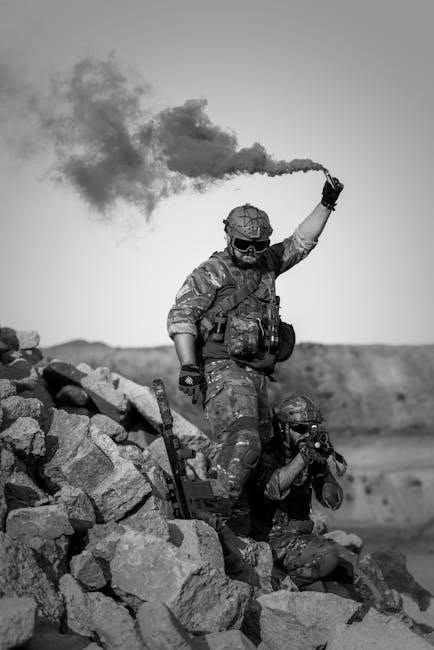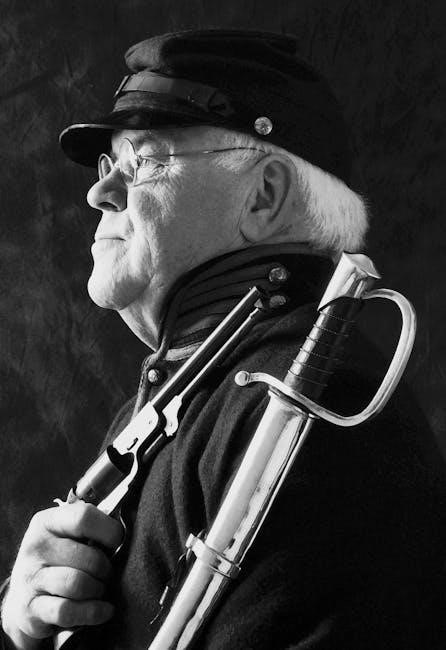David Irving’s Hitler’s War presents a controversial perspective on World War II, focusing on Adolf Hitler’s strategies and decisions, sparking debates among historians and scholars globally.
Background of David Irving
David Irving, a British historian and author, was born in 1938. Known for his meticulous archival research, Irving has written extensively on World War II, often challenging mainstream narratives. His work, including Hitler’s War, has sparked controversy due to its perceived sympathetic portrayal of Adolf Hitler. Irving’s academic background includes studying at the University of London, though he never completed his Ph.D. His focus on primary sources has earned him both acclaim and criticism. Irving has faced accusations of Holocaust denial and ties to revisionist groups, leading to legal battles, including a notable trial in 2000. Despite this, his books remain widely read, with Hitler’s War being particularly divisive. Irving’s work continues to polarize historians and readers, with some praising his research while others condemn his alleged biases.
Overview of “Hitler’s War”
Hitler’s War, written by David Irving, is a meticulously researched historical account that explores World War II from Adolf Hitler’s perspective. Irving draws on extensive primary sources, including diaries, documents, and personal records, to construct a detailed narrative of Hitler’s strategic decisions and leadership. The book challenges conventional historical interpretations by presenting Hitler as a rational, albeit flawed, leader rather than a one-dimensional villain. Irving’s controversial approach has sparked intense debate, with critics accusing him of downplaying Nazi atrocities. Despite this, the book remains a significant work in historical scholarship, offering a unique viewpoint that continues to influence revisionist histories. Its digital versions, particularly the PDF format, have ensured its accessibility, fueling ongoing discussions about its validity and impact. Irving’s work remains a polarizing yet thought-provoking contribution to WWII studies.
Historical Context of World War II
World War II was shaped by geopolitical tensions, fascist ideologies, and the rise of Nazi Germany, with events like the invasion of Poland and the Holocaust defining its course.
Major Events of World War II
World War II was marked by pivotal events that shaped its course and outcome. The invasion of Poland in 1939 triggered the war’s start, while the Battle of Stalingrad and El Alamein were turning points against the Axis powers. The Holocaust, a systematic genocide, claimed millions of lives, particularly at Auschwitz. Irving’s work references these events, though his interpretations remain contentious. The D-Day invasion and the eventual fall of Berlin highlighted the Allies’ resolve. These events, central to WWII’s history, form the backdrop for Irving’s exploration of Hitler’s leadership and strategic decisions, offering a framework for understanding the war’s complexity and its enduring impact on global history.
Adolf Hitler’s Role and Leadership
Adolf Hitler’s leadership during World War II was marked by his centralized command and strategic decisions, which significantly influenced the war’s trajectory. Irving’s work highlights Hitler’s focus on expanding Germany’s territorial control, particularly through the invasion of the Soviet Union in Operation Barbarossa. Hitler’s leadership style was authoritarian, with decisions often driven by his ideological beliefs rather than military pragmatism. Irving explores how Hitler’s directives, such as the scorched-earth policies and the insistence on holding ground, impacted the German war effort. The book also examines Hitler’s evolving mindset, from optimism to desperation, as the Allies gained momentum. Irving’s portrayal underscores the complexities of Hitler’s leadership, blending strategic brilliance with catastrophic misjudgments that ultimately led to Germany’s downfall.

Key Arguments Presented in “Hitler’s War”
Hitler’s War presents a controversial portrayal of Hitler, emphasizing his strategic decisions and arguing he was unaware of the Holocaust, challenging historical views with primary sources.
Hitler’s Strategic Decisions
David Irving’s Hitler’s War delves into Adolf Hitler’s strategic decisions, portraying him as a calculated leader. Irving argues that Hitler’s choices, such as the invasion of the Soviet Union and declaring war on the U.S., were rational responses to circumstances. The book highlights Hitler’s focus on preserving the Third Reich and his belief in avoiding mistakes of World War I. Irving’s portrayal often contrasts with mainstream narratives, suggesting Hitler acted with strategic intent rather than ideological fanaticism. This perspective has sparked debate, with critics accusing Irving of downplaying Nazi atrocities. The book remains a controversial yet detailed analysis of Hitler’s military and political strategies during World War II.
Military Tactics and Execution
David Irving’s Hitler’s War delves into the Führer’s military strategies, emphasizing Hitler’s direct involvement in operational decisions. Irving portrays Hitler as a calculated leader, highlighting tactics like the Blitzkrieg and the invasion of the Soviet Union. The book explores Hitler’s rationale for strategic choices, such as prioritizing certain fronts and allocating resources. Irving’s narrative often defends Hitler’s decisions, suggesting they were based on military necessity rather than ideology. Critics argue this perspective downplays the regime’s atrocities, but Irving’s detailed analysis of battles and campaigns remains a focal point of debate among historians and scholars studying World War II.

Reception and Reviews of the Book

Hitler’s War sparked intense controversy, with historians criticizing Irving’s alleged Holocaust denial and revisionist views, while its PDF version remains widely accessed despite academic disputes.
Initial Reception and Controversy
When first published, Hitler’s War sparked intense debate due to its unconventional portrayal of Adolf Hitler. Critics accused Irving of presenting a biased, sympathetic view of Hitler, often questioning the book’s historical accuracy. The PDF version, widely circulated online, amplified its reach and controversy. Irving faced accusations of Holocaust denial and manipulating evidence to support his narrative. Legal battles, including a high-profile libel trial in 2000, further polarized opinions. Despite criticism, the book gained notoriety for its detailed research, though many historians dismissed it as revisionist propaganda. The digital format ensured its persistence in public discourse, making it a focal point of debates on historical integrity and academic ethics.
Critical Analysis by Historians
Historians have widely criticized David Irving’s Hitler’s War for its revisionist approach and lack of credibility. Many argue that Irving’s portrayal of Hitler is overly sympathetic, downplaying the dictator’s responsibility for atrocities. Critics highlight Irving’s selective use of sources, often ignoring or distorting evidence to support his narrative. His methodology has been questioned, with accusations of cherry-picking documents to fit his thesis. Additionally, Irving’s minimization of the Holocaust and other war crimes has drawn sharp condemnation. While some acknowledge his meticulous research, the broader academic community dismisses his work as ideologically driven rather than objective history. This has led to significant skepticism about his contributions to historical scholarship.
Controversies Surrounding David Irving
David Irving faces accusations of Holocaust denial and distortion of historical facts, leading to legal battles and widespread criticism, as noted in his 1988 testimony and 2025 discussions.
Accusations of Holocaust Denial
David Irving has faced intense scrutiny for his alleged Holocaust denial, particularly in Hitler’s War. Critics argue that Irving downplays the systematic persecution of Jews and questions the scale of the Holocaust. His claims, such as doubting the existence of Auschwitz gas chambers, have drawn sharp criticism. Irving’s testimony in legal cases, like the 1988 Toronto lecture, further fueled accusations. Historians like van Pelt have challenged his interpretations, labeling them as distortions of historical evidence. Irving’s focus on Hitler’s perspective has led some to accuse him of sanitizing the regime’s atrocities. These controversies have significantly impacted his reputation, with many scholars dismissing his work as revisionist and misleading. Irving’s legal battles, including a conviction in Austria, highlight the serious nature of these accusations.

Legal Battles and Trials
David Irving has faced numerous legal challenges due to his controversial views and writings. In 1988, he testified in the Ontario District Court during the trial of Ernst Zündel, where he expressed doubts about the Holocaust. Irving’s statements led to accusations of Holocaust denial, further fueling controversy. In 2000, Irving sued American historian Deborah Lipstadt for libel over her book Denying the Holocaust, which criticized his work. The trial revealed Irving’s manipulation of historical evidence, damaging his credibility. These legal battles highlight the contentious nature of Irving’s scholarship and its implications for historical accuracy and free speech. His legal struggles remain a significant part of his legacy.

The Digital Version of “Hitler’s War”
The PDF format of Hitler’s War has gained significant popularity, offering easy accessibility but also raising concerns about piracy and unauthorized distribution of Irving’s controversial work.

Popularity of the PDF Format
The PDF version of Hitler’s War has gained significant popularity due to its accessibility and ease of sharing. Readers appreciate the ability to access the book digitally, allowing for convenient reading and reference. The format preserves the original text’s integrity, ensuring that Irving’s meticulous research and primary sources remain intact. Its widespread availability online has made it a sought-after resource for those interested in alternative historical perspectives. However, the digital format has also raised concerns about piracy and unauthorized distribution, highlighting the tension between accessibility and copyright issues. Despite these challenges, the PDF remains a preferred format for many, balancing readability with the book’s complex historical narrative.
Accessibility and Piracy Issues
The digital version of Hitler’s War has raised concerns regarding accessibility and piracy. While the PDF format makes the book widely available, it also facilitates unauthorized sharing and illegal downloads. This has led to debates about the balance between open access to historical knowledge and the protection of intellectual property. Some argue that digital platforms democratize information, while others highlight the risks of copyright infringement and the loss of revenue for authors and publishers. The ease of sharing PDFs has further complicated efforts to control the book’s distribution, particularly given its controversial content. This tension underscores the challenges of managing historical scholarship in the digital age.
Impact on Historical Scholarship
Hitler’s War has significantly influenced revisionist history, challenging mainstream narratives and sparking debates among scholars, despite criticism for its controversial interpretations and sources.
Influence on Revisionist History

David Irving’s Hitler’s War has significantly influenced revisionist history, offering a perspective that challenges mainstream narratives of World War II. Irving’s meticulous research and use of primary sources, such as Hitler’s personal diaries and confidential documents, have made the book a cornerstone for revisionist scholars. His portrayal of Hitler as a strategic leader, rather than a tyrannical figure, has sparked debates about the Führer’s role in the war. While criticized for alleged historical inaccuracies, the book remains a key text in revisionist circles, prompting reevaluations of Hitler’s decisions and the broader context of the conflict. Its influence continues to shape alternative historical interpretations, despite ongoing controversies.
Criticism from Mainstream Historians
David Irving’s Hitler’s War has faced intense criticism from mainstream historians, who argue that the book lacks objectivity and promotes a revisionist agenda. Many scholars accuse Irving of selectively using sources to portray Hitler in a more favorable light, often downplaying or ignoring the atrocities committed during the Holocaust. Critics emphasize that Irving’s methodology undermines the credibility of historical scholarship, as it prioritizes ideology over factual accuracy. The book’s focus on Hitler’s perspective has been particularly contentious, with historians asserting that it distorts the broader context of World War II. Legal battles and accusations of Holocaust denial have further tarnished Irving’s reputation, leading many to dismiss his work as discredited within the academic community.

Themes and Perspectives in the Book
Hitler’s War explores Hitler’s viewpoint, justifying his actions through primary sources, creating a controversial yet intimate portrayal of his leadership and strategic decisions during WWII.
Hitler’s Viewpoint and Justification
In Hitler’s War, David Irving attempts to present Adolf Hitler’s perspective on World War II, offering a narrative that often justifies or downplays Hitler’s role in key events. Irving portrays Hitler as a strategic leader, emphasizing his military decisions and objectives while minimizing the atrocities committed under his regime. The book relies heavily on primary sources, including Hitler’s personal diaries and confidential documents, to construct a detailed yet controversial account. Irving’s portrayal often aligns with revisionist history, sparking intense debate among historians. Critics argue that the book distorts historical facts, particularly regarding the Holocaust, while supporters claim it provides a unique insight into Hitler’s mindset. The justification of Hitler’s actions remains a central and divisive theme in Irving’s work.
Historical Sources and Evidence
David Irving’s Hitler’s War relies heavily on primary sources, including Hitler’s personal diaries, military documents, and eyewitness accounts. Irving claims to present an intimate portrayal of Hitler’s decision-making process, supported by extensive archival research. The book incorporates transcripts from trials, such as the District Court of Ontario, and references to Auschwitz, highlighting Irving’s focus on detailed historical records. However, critics argue that Irving selectively interprets these sources to align with his revisionist views. Despite the meticulous gathering of documents, the credibility of Irving’s interpretations remains contentious, as many historians question his methodology and bias. The use of primary sources adds depth but also fuels debates about the book’s historical accuracy and intent.
Hitler’s War remains a controversial yet meticulously researched work, offering unique insights into WWII from Hitler’s perspective, sparking debates and challenging historical narratives with its detailed approach.
Hitler’s War by David Irving offers a detailed yet controversial account of World War II from Adolf Hitler’s perspective, using primary sources like diaries and documents. Irving argues that Hitler was unaware of the Holocaust, sparking intense debate. The book challenges mainstream historical narratives, leading to accusations of Holocaust denial. Despite criticism, it remains a significant work in revisionist history, influencing ongoing discussions about WWII. Irving’s meticulous research and unique viewpoint have polarized scholars, with some praising his attention to detail while others condemn his alleged biases. The book’s legacy underscores the complexities of historical interpretation and the challenges of objective scholarship.
Final Thoughts on the Book’s Significance
Hitler’s War remains a polarizing work, offering a unique perspective on World War II through Hitler’s lens. While Irving’s meticulous research and use of primary sources are commendable, his interpretations have sparked intense debate. Critics argue that the book downplays Nazi atrocities, particularly the Holocaust, raising ethical concerns. Despite controversy, it has influenced revisionist history and continues to be a subject of academic discussion. The digital availability of the book, especially in PDF format, ensures its accessibility, though it also raises issues of piracy and misinformation. Ultimately, Hitler’s War challenges readers to critically evaluate historical narratives, emphasizing the importance of balanced scholarship in understanding complex events.
Legacy of the Book
Hitler’s War remains a controversial yet influential work, shaping debates on World War II history, with its digital versions widely accessed despite concerns over piracy and academic integrity.

Cultural and Historical Impact
Hitler’s War has left a significant mark on historical discourse, challenging conventional narratives of World War II. Its controversial perspective has sparked intense debates, influencing public perception and scholarly discussions. While criticized for its alleged bias, the book has undeniably shaped revisionist history, prompting reevaluations of Hitler’s role. The digital PDF version has broadened its reach, ensuring ongoing debates about its interpretations. Despite criticism, the work remains a focal point in historical scholarship, reflecting the complexities of interpreting wartime leadership and the ethical challenges of historical writing. Its impact underscores the importance of critical engagement with historical sources and the need for nuanced understanding of one of history’s most tumultuous periods.
Educational Use and Debate
David Irving’s Hitler’s War has sparked intense debate in educational circles due to its controversial perspective on World War II. While some educators use it to encourage critical thinking about historical narratives, others criticize its alleged biases and inaccuracies. The book’s detailed research and unique viewpoint often prompt discussions on historical interpretation and the ethics of presenting history. However, its association with Holocaust denial and Irving’s legal battles have led many institutions to approach it with caution. Despite this, the PDF version’s accessibility has made it a focal point for debates on academic integrity and the challenges of teaching revisionist histories. Its impact on education remains a contentious issue.
The Future of Historical Writing
Digital scholarship and open access are reshaping historical research, offering unprecedented accessibility but also challenging academic integrity amid rising concerns about piracy and misinformation.
Digital Scholarship and Open Access
The rise of digital scholarship has transformed how historical works like Hitler’s War are accessed and shared. The PDF format of Irving’s book has gained popularity, enabling widespread dissemination and easy access to its content. This shift reflects broader trends in academic publishing, where digital platforms democratize knowledge. However, the ease of sharing PDFs also raises concerns about piracy and the loss of authorial control. Open access initiatives promote transparency and collaboration, but they also challenge traditional publishing models. The digital availability of Hitler’s War highlights the tension between accessibility and intellectual property rights, sparking debates about the future of historical scholarship in the digital age.
Challenges of Academic Integrity
The digital availability of Hitler’s War raises concerns about academic integrity, as its controversial content often blurs fact and opinion. Irving’s methods, such as selective sourcing and reinterpretation of historical events, have led critics to question his credibility. The ease of accessing the PDF online has also made it a target for misinformation and piracy, undermining legitimate scholarly efforts. Additionally, the book’s influence on revisionist history has sparked debates about ethical standards in historical writing. Scholars emphasize the need for critical evaluation of sources and transparent methodologies to maintain academic integrity, especially when engaging with contentious works like Irving’s.
